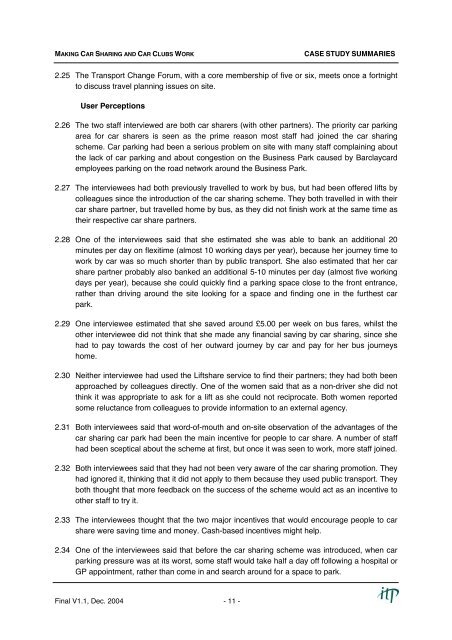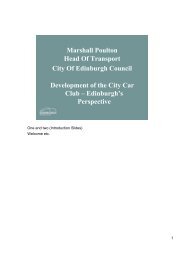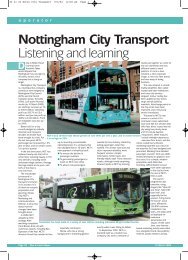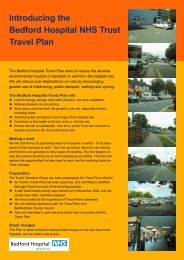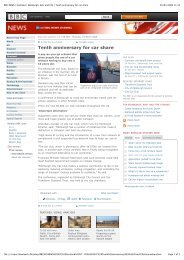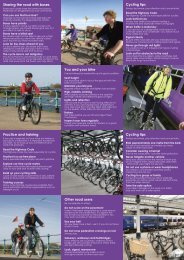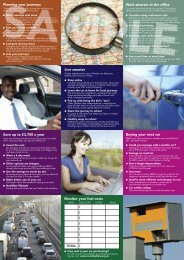Case Study Summaries - Richard Armitage Transport Consultancy ...
Case Study Summaries - Richard Armitage Transport Consultancy ...
Case Study Summaries - Richard Armitage Transport Consultancy ...
You also want an ePaper? Increase the reach of your titles
YUMPU automatically turns print PDFs into web optimized ePapers that Google loves.
MAKING CAR SHARING AND CAR CLUBS WORK CASE STUDY SUMMARIES<br />
2.25 The <strong>Transport</strong> Change Forum, with a core membership of five or six, meets once a fortnight<br />
to discuss travel planning issues on site.<br />
User Perceptions<br />
2.26 The two staff interviewed are both car sharers (with other partners). The priority car parking<br />
area for car sharers is seen as the prime reason most staff had joined the car sharing<br />
scheme. Car parking had been a serious problem on site with many staff complaining about<br />
the lack of car parking and about congestion on the Business Park caused by Barclaycard<br />
employees parking on the road network around the Business Park.<br />
2.27 The interviewees had both previously travelled to work by bus, but had been offered lifts by<br />
colleagues since the introduction of the car sharing scheme. They both travelled in with their<br />
car share partner, but travelled home by bus, as they did not finish work at the same time as<br />
their respective car share partners.<br />
2.28 One of the interviewees said that she estimated she was able to bank an additional 20<br />
minutes per day on flexitime (almost 10 working days per year), because her journey time to<br />
work by car was so much shorter than by public transport. She also estimated that her car<br />
share partner probably also banked an additional 5-10 minutes per day (almost five working<br />
days per year), because she could quickly find a parking space close to the front entrance,<br />
rather than driving around the site looking for a space and finding one in the furthest car<br />
park.<br />
2.29 One interviewee estimated that she saved around £5.00 per week on bus fares, whilst the<br />
other interviewee did not think that she made any financial saving by car sharing, since she<br />
had to pay towards the cost of her outward journey by car and pay for her bus journeys<br />
home.<br />
2.30 Neither interviewee had used the Liftshare service to find their partners; they had both been<br />
approached by colleagues directly. One of the women said that as a non-driver she did not<br />
think it was appropriate to ask for a lift as she could not reciprocate. Both women reported<br />
some reluctance from colleagues to provide information to an external agency.<br />
2.31 Both interviewees said that word-of-mouth and on-site observation of the advantages of the<br />
car sharing car park had been the main incentive for people to car share. A number of staff<br />
had been sceptical about the scheme at first, but once it was seen to work, more staff joined.<br />
2.32 Both interviewees said that they had not been very aware of the car sharing promotion. They<br />
had ignored it, thinking that it did not apply to them because they used public transport. They<br />
both thought that more feedback on the success of the scheme would act as an incentive to<br />
other staff to try it.<br />
2.33 The interviewees thought that the two major incentives that would encourage people to car<br />
share were saving time and money. Cash-based incentives might help.<br />
2.34 One of the interviewees said that before the car sharing scheme was introduced, when car<br />
parking pressure was at its worst, some staff would take half a day off following a hospital or<br />
GP appointment, rather than come in and search around for a space to park.<br />
Final V1.1, Dec. 2004 - 11 -


